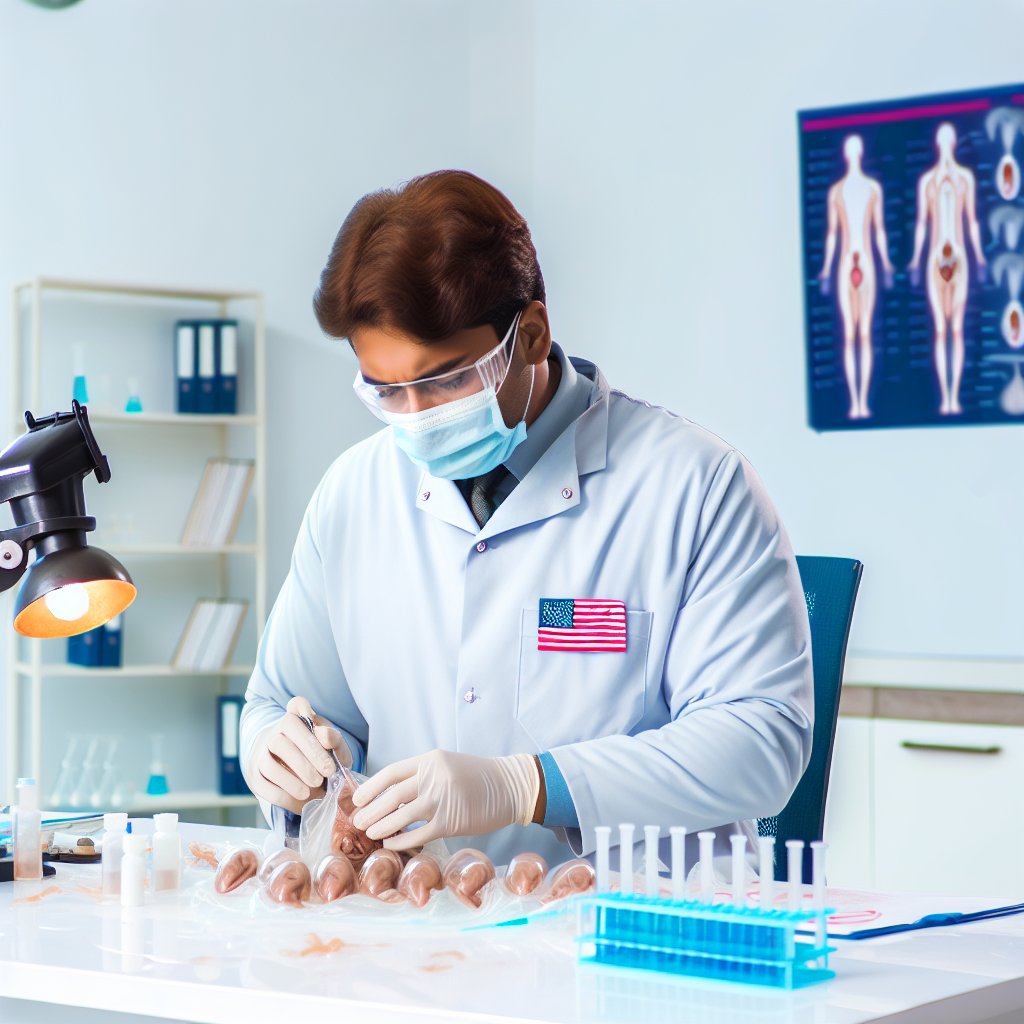Introduction
Insemination technicians play a crucial role in the agricultural industry by performing artificial insemination on livestock animals.
Their expertise ensures successful breeding and genetic improvement within livestock populations.
Brief Explanation of Insemination Technicians’ Responsibilities
Insemination technicians are responsible for collecting, preparing, and inseminating animal semen to facilitate breeding.
They must have a strong understanding of animal anatomy and reproductive systems.
Importance of Insemination Technicians in Agriculture
The work of insemination technicians is essential for maximizing genetic potential, improving herd quality, and increasing productivity in livestock operations.
Their skills help farmers achieve specific breeding goals efficiently.
Overview of Job Market Outlook for Insemination Technicians in 2024
As advancements in technology and genetic research continue to shape the agricultural sector, the demand for skilled insemination technicians is expected to rise.
With an increased focus on breeding for specific traits and qualities, the role of insemination technicians is becoming more specialized and critical in livestock production.
Individuals pursuing a career as an insemination technician can expect favorable job prospects in 2024, particularly in larger livestock operations and breeding facilities.
Employers will seek candidates with both technical skills and a deep understanding of animal breeding practices to meet the industry’s evolving needs.
Demand for Insemination Technicians
The job market for insemination technicians is expected to grow significantly in 2024.
With the increasing demand for dairy and livestock products, the need for skilled technicians is crucial.
Insemination technicians play a key role in improving breeding practices to meet the market demands.
Impact of Technology on the Insemination Process
Technology has revolutionized the insemination process, making it more efficient and precise.
Technicians now have access to advanced tools and equipment that enhance their capabilities.
Training in the use of technology has become essential for insemination technicians to stay competitive.
Opportunities for Insemination Technicians in 2024
As the demand for dairy and livestock products continues to rise, the job market for insemination technicians is projected to expand.
Technicians with specialized skills and training in new technologies will have a competitive edge in the industry.
There is a need for more qualified professionals to meet the growing demand for insemination services.
Challenges Faced by Insemination Technicians
Despite the growing demand, insemination technicians face challenges such as long hours and physically demanding work.
Transform Your Career Today
Unlock a personalized career strategy that drives real results. Get tailored advice and a roadmap designed just for you.
Start NowThe job can be stressful at times, especially during breeding season when the workload is high.
Technicians must be prepared to work in various weather conditions and handle large animals with care.
Job Market Outlook for Insemination Technicians
The job market outlook for insemination technicians in 2024 is promising, with opportunities for growth and advancement.
Technicians who stay updated on new technologies and trends will be well-positioned for success in the industry.
As the demand for dairy and livestock products increases, the need for skilled insemination technicians will continue to grow.
Job opportunities for insemination technicians
Insemination technicians play a crucial role in the agricultural sector.
They assist in the reproduction of livestock.
These professionals are in high demand due to the importance of ensuring successful breeding programs in dairy farms, livestock operations, and breeding centers.
Employment prospects in dairy farms, livestock operations, and breeding centers
Insemination technicians are vital members of the workforce in dairy farms.
They work closely with veterinarians and farm managers.
This ensures the health and productivity of the herd.
In livestock operations, these technicians oversee the breeding of various animals, such as cattle, pigs, and sheep.
Additionally, breeding centers rely on insemination technicians to manage the reproductive processes of valuable breeding stock, including horses and exotic animals.
Potential for growth in specialized areas such as genetic engineering and biotechnology
With advancements in technology and research, the field of animal reproduction is evolving.
Insemination technicians have the opportunity to expand their skills and knowledge in specialized areas.
These areas include genetic engineering and biotechnology.
Such advancements allow technicians to work with cutting-edge tools and techniques.
This ultimately improves breeding outcomes and animal health.
Availability of positions in both rural and urban settings
Insemination technicians can find opportunities in a variety of settings.
These include rural farms, urban breeding facilities, and research laboratories.
Transform Your Career Today
Unlock a personalized career strategy that drives real results. Get tailored advice and a roadmap designed just for you.
Start NowWhether working on a small family farm or in a state-of-the-art breeding center, technicians have options.
They can choose a work environment that aligns with their interests and career goals.
- Competitive salaries and benefits
- Job stability and security
- Opportunities for advancement and professional development
- Emphasis on work-life balance
The job market outlook for insemination technicians in 2024 is promising.
There is a growing demand for skilled professionals in the field of animal reproduction.
As the agricultural industry continues to evolve, these technicians will play a vital role.
They ensure the success and sustainability of breeding programs in various settings.
Whether working in traditional roles or exploring new opportunities, insemination technicians can look forward to a rewarding career.
Fulfillment awaits them in the years to come.
Delve into the Subject: Future of Pest Control Advisory Services
Required skills and qualifications
Strong understanding of animal biology and reproductive systems.
Excellent attention to detail and observational skills.
Ability to work in a team and follow strict protocols.
Good communication skills for interacting with clients and colleagues.
Physical stamina to handle the demands of the job.
Training and education requirements for becoming an insemination technician
Completion of a bachelor’s degree in animal science or related field.
Participation in specialized training programs for artificial insemination techniques.
Internship or practical experience working with livestock or other animals.
Continuing education to stay updated on current practices and technology.
Importance of hands-on experience in animal husbandry
Hands-on experience in animal husbandry is crucial for insemination technicians.
This experience helps them understand the behavior and needs of the animals they work with.
Transform Your Career Today
Unlock a personalized career strategy that drives real results. Get tailored advice and a roadmap designed just for you.
Start NowSuch experience helps technicians develop the necessary skills for handling and caring for animals in a variety of situations.
Certifications and licenses needed to practice in the field
Certification from the American Association of Bovine Practitioners (AABP).
Licensure from the state board of veterinary medicine.
Additional certifications for specific species or techniques.
Regular renewal of licenses and certifications through continuing education.
Delve into the Subject: Dairy Science Scholarships and Funding Options
Salary and Benefits
Being an insemination technician can be a rewarding career path, both financially and in terms of benefits.
Let’s take a closer look at the average salary range, benefits, and opportunities for advancement in this field.
Average Salary Range for Insemination Technicians
As of 2024, the average salary range for insemination technicians varies depending on location, experience, and employer.
On average, technicians can expect to earn between $40,000 to $60,000 per year.
Entry-level technicians may start at the lower end of the range, while experienced technicians with specialized skills can earn upwards of $70,000 annually.
Benefits such as Health Insurance, Retirement Plans, and Paid Time Off
One of the key advantages of working as an insemination technician is the benefits package offered by employers.
This typically includes health insurance coverage, retirement plans such as 401(k) contributions, and paid time off for vacation, sick leave, and holidays.
Some employers may also provide additional perks like tuition reimbursement for career development.
Opportunities for Advancement and Career Development
For insemination technicians looking to grow their careers, there are ample opportunities for advancement and professional development.
Technicians can advance to supervisory roles or specialize in areas such as embryo transfer, semen analysis, or reproductive health research.
Many employers offer training programs, workshops, and certifications to help technicians enhance their skills and stay current with industry trends.
Learn More: How Plant Pathologists Use Molecular Techniques

Challenges facing insemination technicians
Being an insemination technician comes with several challenges that individuals in this profession must navigate.
From physical demands to work environment challenges in agricultural settings, insemination technicians need to be prepared for a variety of obstacles in their day-to-day work.
Transform Your Career Today
Unlock a personalized career strategy that drives real results. Get tailored advice and a roadmap designed just for you.
Start NowPhysical demands of the job
- Heavy lifting is often required when transporting equipment and supplies.
- Prolonged periods of standing or kneeling can lead to physical strain.
- Repetitive motions during insemination procedures can cause muscle fatigue.
- Exposure to chemicals and biological hazards may pose health risks.
Work environment challenges in agricultural settings
- Extreme weather conditions can make outdoor work uncomfortable.
- Working with large animals can be intimidating for some technicians.
- Remote locations may require extensive travel to reach clients.
- Lack of proper facilities for procedures can hinder efficiency.
Need for continuous training to stay updated on industry developments
- New technologies and techniques are constantly emerging in the field.
- Ongoing education is essential to maintain proficiency in the latest practices.
- Keeping abreast of industry trends can enhance job performance and job market competitiveness.
- Specialized training programs may be required to learn advanced insemination methods.
Delve into the Subject: Extension Agents and Sustainable Soil Practices
Job outlook in the current economic climate
Insemination technicians play a crucial role in the agricultural industry.
As technology continues to advance, the demand for skilled technicians is expected to rise.
The job market for insemination technicians looks promising in the coming years.
Impact of COVID-19 on the agricultural industry and job opportunities for insemination technicians
The COVID-19 pandemic has significantly impacted the agricultural industry.
Farmers are looking for efficient and cost-effective ways to manage their operations.
This has created opportunities for insemination technicians who can help improve breeding practices and increase productivity.
Changes in consumer demand and market trends affecting the need for skilled technicians
Consumer demand for high-quality dairy and meat products is increasing.
This trend is driving the need for skilled insemination technicians who can help improve breeding programs and enhance the genetic traits of livestock.
As more consumers prioritize sustainable and ethically sourced products, the demand for technicians with expertise in animal genetics is expected to grow.
Government policies and regulations influencing the job market for insemination technicians
Government policies and regulations play a significant role in shaping the job market for insemination technicians.
Regulations related to animal welfare, genetic testing, and breeding practices can impact the demand for skilled technicians.
Additionally, government initiatives to support sustainable agriculture and promote research and development in animal genetics can create new opportunities for technicians in the field.
Job Market Outlook for Insemination Technicians
The job market outlook for insemination technicians in 2024 looks promising.
With the increasing demand for dairy and livestock products, the need for skilled technicians will continue to grow.
Individuals considering a career as an insemination technician should pursue relevant education and training.
This can enhance their skills and knowledge in the field.
Insemination technicians play a crucial role in the agricultural industry.
They help to improve livestock breeding outcomes.
Their contributions support the overall success of farms and ranches.
Transform Your Career Today
Unlock a personalized career strategy that drives real results. Get tailored advice and a roadmap designed just for you.
Start NowAdditional Resources
2018 Standard Occupational Classification System : U.S. Bureau of …
Abraham Baldwin Agricultural College: Home
[E-Books for Sale]
The Big Book of 500 High-Paying Jobs in America: Unlock Your Earning Potential
$19.99 • 500 High-Paying Jobs • 330 pages
Explore 500 high-paying jobs in America and learn how to boost your career, earn more, and achieve success!
See All 500 High-Paying Jobs of this E-Book
1001 Professions Without a Degree: High-Paying American Jobs You Can Start Now
$19.99 • 1001 Professions Without a Degree • 174 pages
Discover 1001 high-paying jobs without a degree! Unlock career tips, skills, and success strategies for just $19.99!




